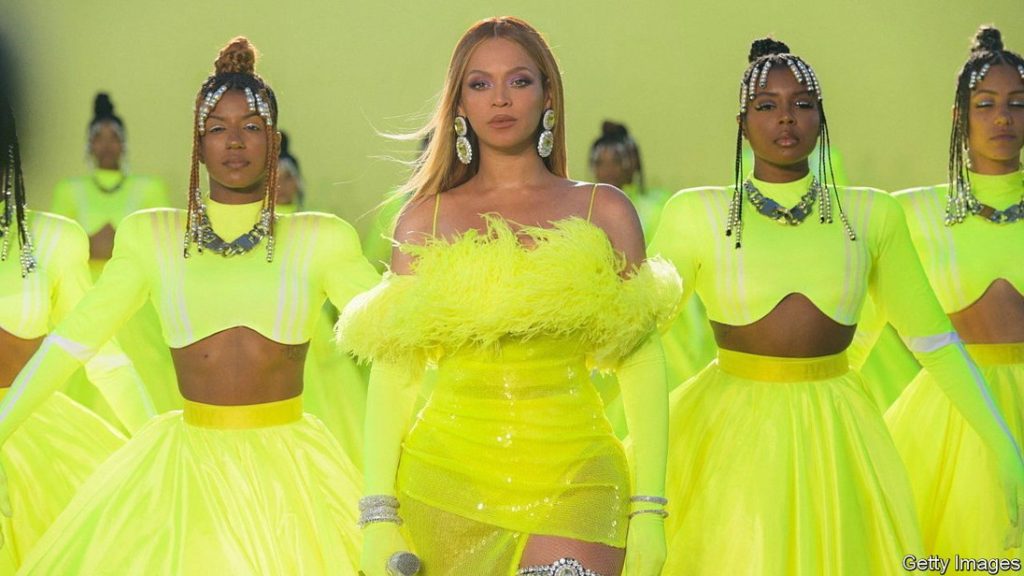
THE PHRASE “too big to fail” was popularised by the press and politicians in the late 20th century, used to discuss financial behemoths. Today it is a pop-culture phenomenon, too, as many superstars enjoy unquestioning critical veneration. This is driven by a number of factors—chief among them journalists’ fear of a social-media backlash (one writer was trolled after Lana Del Rey, an American singer-songwriter, took exception to a review that was actually overwhelmingly positive, just not in the way Ms Del Rey wanted.) There is also the fact that the biggest stars rarely let their records go to reviewers before release, resulting in articles written on the fly, in which no one wants to be the person out of step. Lastly there is the rise of “poptimism”—the insistence that pop is as valuable as rock—which is fine and fair in itself, but has in practice led to uncritical fawning over the very superstars who do not need pundits’ love to succeed.
One such beneficiary of this trend has been Beyoncé Knowles, who now appears to occupy a cultural position somewhere between Maya Angelou, Billie Holiday, James Baldwin and St Bernadette. She had become, in an increasingly popular phrase, “culturally dominant”. Her seventh solo album, “Renaissance”, arrives not so much as a release, but as an event, heralded not just by reviews, but by reviews of reviews, previews, analyses of track titles and parsings of the lyrics. What does it all mean?
Mostly it means that Beyoncé has returned to her pop roots. “Lemonade” (2016), her previous solo work, was a remarkable thing: a blockbuster that sombrely addressed her marriage, feminism and black identity. It contained some startling standout tracks, though it wasn’t exactly dripping with club bangers. And “Lemonade” was followed by an underwhelming album with her husband, Jay-Z, working together as The Carters, and then a puzzling album, largely collaborative, inspired by Disney’s “The Lion King”. Even those two records were often fawned over, though “The Lion King” album seemed a little pointless even to some who reviewed it favourably. Only one review of “Everything Is Love” suggested that “the most boring aspect of the album is its centrepiece: the couple’s obsession with their wealth.”
That Beyoncé was looking to reclaim her pop as well as her cultural dominance was signalled by “Break My Soul”, the lead single on “Renaissance”, a piece of Nineties house revival that was very clearly aimed at the dance floor. The single is a dazzling feat of production, as sparse instrumentation has been turned into a song by Beyoncé’s voice and the clever use of effects. (Listen to the a cappella and instrumental versions on streaming services to see how the vocal works.)
“Renaissance” comes armed with several tracks that seem destined to blare out of shop sound systems for the rest of the year. The effortless and joyful “Cuff It” capitalises on Nile Rodgers’s current ubiquity by recreating the sound of Chic; “Plastic off the Sofa” is delicious neo-soul, as weightless as a dandelion clock. But the strength of “Renaissance” is its variety: the Afrobeats that were prevalent on her “Lion King” album are present, but so are elements of hip-hop and dancehall. It never stands still, and her many songwriting and production collaborators help “Renaissance” sound both adventurous and populist.
Beyoncé is now at the stage where everything she does is treated as the work of an auteur. (She announced that “Renaissance” is the first part of a “three-act project”: a clear statement of artistic intent.) It is hard, then, not to read the lyrics as directly relating to her life. On “Cozy” she insists: “Comfortable in my skin/Cozy with who I am.” In which case, you wonder, why does she have to spend so much time emphasising her prominence? “I’m one of one, I’m number one,/I’m the only one/Don’t even waste your time trying/to compete with me,” offers “Alien Superstar”, while elsewhere she repeatedly refers to her own physical wondrousness. It is all great fun, and fascinating, too. But it is not doing Beyoncé a disservice to say that “Renaissance” is a very good, state-of-the-art R’n’B album, rather than the cultural statement of the year.
By The Economist




